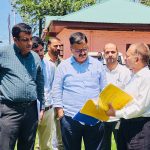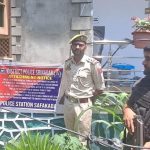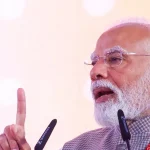Jammu and Kashmir Students Association delegation on Sunday called on J-K Lieutenant Governor Manoj Sinha at Raj Bhavan in Srinagar and apprised him about various issues of students and youth-related programs, policies in the Union territory. During the meeting, a delegation led by the National Convenor of Association Nasir Khuehami shared various issues faced by the students. Those who were part of delegation include National Spokesperson Ummar Jamal, National Secretary Davood Peer and tribal leader Showkat Choudhary.
Delegation submitted a memorandum of demands pertaining to the welfare of student community of J&K including establishment of National Law University; introduction of training course for teachers of Higher education; establishment of Women Degree College in Bandipora; enhancing PG seats in medical colleges in J&K and fast-tracking of recruitment process.
In a Statement National convener of association Nasir Khuehami said,” we brought the issue of delayed exams and delayed results into the kind notice of Lieutenant Governor Manoj Sinha, Results are not uploaded on time, Examinations are not held as per schedule, Academic calendar is not followed in letter and spirit & there is strong need of changing this system of delayed exams and delayed degrees in Kashmir University. Moreover, “One Person, One Post Policy” is not followed in Kashmir university due to which the students have to suffer academically. Faculty members are being appointed on administrative positions. Nearly a dozen teachers and officers are holding administrative positions as Additional Charge.”, he added.
The other main demands put forward by the delegation include favouritism and nepotism prevalent in Kashmir university. Replying to it Lieutenant Governor assured that, it will be uprooted soon. Khuehami brought long pending demand of students of Bandipora to establish a Women’s Degree College there in his notice. “Bandipora, which is known for Alim (knowledge) Adab (Habits and literature) and Aab (water) has been unfortunately neglected by successive governments vis-a-vis establishment of women’s degree college. Female students of Bandipora have to either go for Srinagar or Baramulla for further studies as result of which large number of students give up their studies after passing their 12th class. Students from Ajas, Gamroo, Aragam, Papachan, Nadihal, and other adjoining areas have to travel all along to Srinagar for higher education after class 12th as it takes less time to reach Srinagar than to GDC Bandipora.
National Spokesperson of the association Ummar Jamal apprised Lieutenant Governor that, J&K is in strong need of National Law University. He informed him that, Karnataka got its National Law University in 1988, but J&K is yet to get one even after interlude of 34 odd years after establishment of first NLU. Twenty one states in India have established NLU’s. J&K despite being the 12th largest among the 37 State/UT in terms of geographical area and 19th in terms of population with more than 14 million people is yet to have its own National Law University.
Jamal requested Lieutenant Governor to poste-haste set up National law University in order to bring J&K at par with other states which already have National law universities. He also requested him for introduction of training course for teachers of Higher education. The other demands projected and highlighted by the association include-; Increasing 3 to 4 supernumerary and reservation seats in each prestigious universities, introduction of training course for teachers of higher education.
Responding to the requests of association on the Occasion, Lieutenant Governor Manoj Sinha gave patient hearing to the problems and assured that all possible steps are being taken for them and would be looked into and addressed on merit. He informed that, the J&K government has reconstituted the Higher Education Council (HEC) for two years to guide the government on policy-making and innovations in the Higher Education Department, which will be headed by himself by introducing such measure here. J&K can become first state in India to introduce such a revolutionary measure in higher education department.
Davood peer, National Secretary of Association extended gratitude to the Lieutenant Governor for patient hearing and hoped that all the issues brought into his notice will be redressed as soon as possible. He requested Lieutenant Governor for fast-track recruitment process so that students appearing for different competitive examinations don’t suffer. He also entreated him to enhance PG seats in medical colleges across Jammu and Kashmir. While interacting with the delegation of J&K Students Association, the Lieutenant Governor observed that the UT Government is making dedicated efforts to ensure access to quality education for all.
We are implementing the National Education Policy in letter and spirit and ensuring that all the educational institutions maintain academic standards and empower students to be a key driver of socio-economic growth of the Union territory of J&K and the nation, added the Lieutenant Governor. He informed that he has been closely monitoring the situation and student issues and offered all possible support. Lieutenant Governor assured delegation that administration is going to conduct the re-examinations of J&K Sub-Inspector, Finance Account assistant and JE posts at the earliest, hopefully by the month of November. He made it clear that gone are the days when people will be selected by running a racket. Culprits will not be spared, few have been arrested and are behind bars & there won’t be compromise on merit. Students will be provided best of the support in every regard, he assured delegation.
Tribal Leader Showkat Choudhary extended his gratitude for the steps taken by LG administration since being in office for empowerment of Tribal Students through education by introducing new initiatives like “Star-100”, ”Host-50”, modernization of tribal student hostels etc. Association also thanked administration for addressing Pahari Student issues on merit. However, more work needs to be done on Poor physical facilities, expensive schooling, lack of teaching staff and punitive practices in educational institutions falling in tribal areas.








